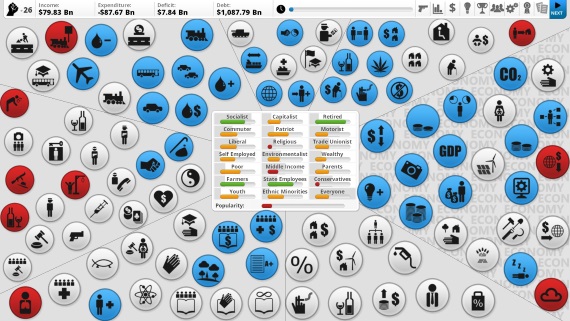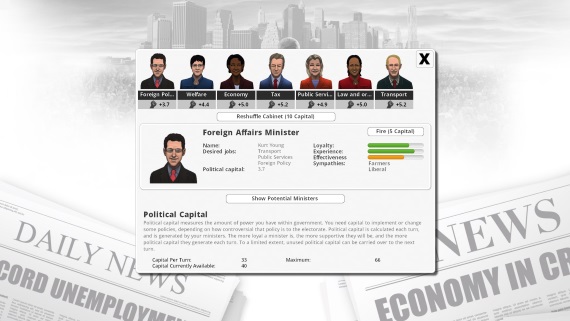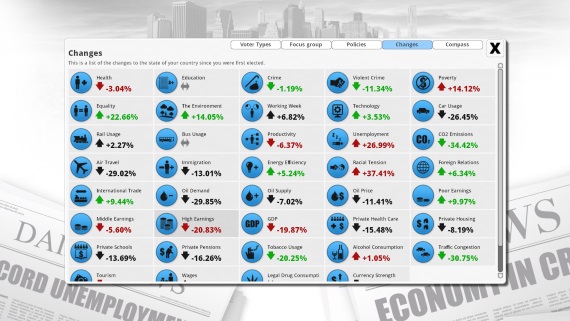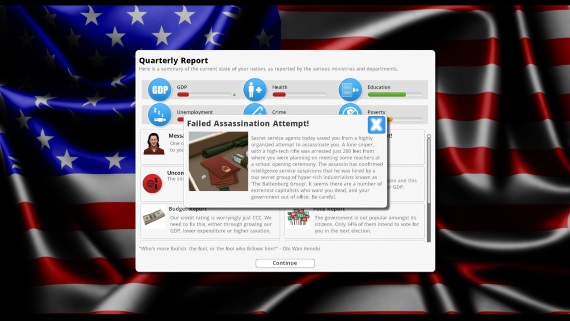
Not having played any of its predecessors, I found Democracy 3 to be fairly interesting, more like a toy than a game. The premise here is that you’re the government of a country. It’s up to you to set the policies that guide your country towards what you envision would be best for it. At the same time, you need to remain popular enough to win elections and avoid being hated so much that you get assassinated.
- The game bills itself as being the most sophisticated simulation of its kind. It’s true that it kind of boggles your mind at first when you take in how everything influences everything else. Alcohol consumption for example affects health, crime and productivity and is itself affected by unemployment, laws and taxes on alcohol, policing levels and GDP. But GDP of course is affected by productivity and so forth. But look closer and the shallowness of the simulation becomes evident in many areas. The population being simulated doesn’t seem to actually change over time, but the proportions of the different groups that collectively make up that population does. So increasing immigration doesn’t actually increase population. Instead, it converts natives into immigrants! It’s very weird and is a serious immersion breaker for me.
- Contrary to expectations, especially if you’ve played a game like Stardock’s The Political Machine, there is no campaigning and indeed no notion of yourself as an individual politician. The only action you can do is set policy. You can choose ministers to serve in your government but the mechanics here are very simple as well. Their loyalty to you is strictly based on how popular you are among the groups they favour and their own effectiveness as a minister depends both on which portfolio they prefer and their experience which automatically increases as a function of time. Ministers also contribute political capital which is what you need to change policies. This serves to prevent you from changing all of the policies to whatever you want in a single turn.

- A simple improvement would be making the political capital cost of changing policies scale in proportion to the magnitude of the change. Currently there are different costs for increasing and decreasing the intensity of a policy or cancelling it altogether. But if you only want to increase it, then it costs the same whether you go up a tiny bit or max out the slider, which doesn’t make much sense. That is, the political difficulty of raising income tax by 1% is way different from raising it by 10%.
- One cool feature that makes this more of a game are the events. They occur when certain prerequisites are met. So for example Internet Crime appears when your Technology and general Crime reaches a certain level. Then it does bad things to your GDP. But to make it go away, it isn’t enough to just drop under the prerequisites. You need to make the causes drop much more than that. This effectively gives you various mini-goals to achieve that make this more of a game. Interestingly, there are good events too which give bonuses, such as Technological Advantage which happens when your population is well educated and your technology base is high, boosting GDP and productivity. Unfortunately you can’t see the prerequisites of the events, good or bad, before they kick in so you can’t really plan for them unless you already know beforehand that they exist.
- Generally the scenarios seem pretty easy once you understand how the simulation works. Given time, it’s not hard to get re-elected by 99% of the electorate again and again, which should be impossible if this were any kind of a realistic simulation. Part of this is because the simulation works out okay for short spans of time but becomes increasingly unrealistic over time. After all, neither you nor your ministers ever age, poor people never graduate to the middle class even if you massively raise their incomes, the proportion of people who are motorists never seems to go down much no matter how much you penalize drivers and so forth.

- The one exception that I can think of is the USA scenario which starts off with the government being very unpopular, the fiscal position being terrible and all kinds of terrible situations including crime, unemployment and poor competitiveness. Note that it isn’t particularly realistic since the USA despite whatever deficits it runs, has always enjoyed exceptionally low interest rates. Combine this with the high levels of apathy, which makes it so that the voters who like you slightly are unlikely to actually turn out to vote, while those who hate you with a passion turn out in droves, this becomes a nightmare scenario. In fact, it is a challenge to actually survive for long past the first election. Assassinations are distressingly common in the game, which again, isn’t really that realistic.
- I was surprised to find how difficult it is for me to enact policies that I personally dislike even though I know that this would be what I need to “win” the scenario. This is especially evident for the US which is much more conservative than the other countries included. I know that stuff like “School Prayer” and “Gated Communities” are vote winners, but actually enacting them is just too painful for me. I find that time after time, I fall back on my personally favoured policies: high state spending on health and education, low or no state spending on pensions, housing and child benefits. Lots of support of green initiatives including hybrid cars, energy efficiency, carbon taxes, renewable energy etc., some support for enterpreneurship, low to no sales taxes, low corporation taxes, medium income taxes, petrol taxes and inheritance taxes. On social issues, I’m a liberal all the way with the explicit aim of zeroing out the religious group with lots of education and technology initiatives. In all scenarios except for the USA, this seems like an easy way to get close to 99% popularity.
- I also note that policies don’t always seem fairly balanced or realistically set. For example, Telecommuting Initiative looks like a no-brainer given how little it costs and how it makes people happy and reduces traffic congestion. Other things like Food Stamps and School Lunches look like unequivocally great buys too. I was also shocked by how good having a Space Program is. It makes the Patriots among your population very happy, employs lots of people and increases your technology base. In real life, it often seems like a white elephant to me.
Overall, I enjoyed my time in this while noting it doesn’t have much lasting appeal or replay value. I guess unless you are willing to spend a lot of time experimenting with weird and extremist governments for fun. I think it would stand to gain a lot by simulating many more aspects of a country, actual population changes, politicians as distinct individuals, more than two political parties, etc. It could also use some user interface improvements. For example, it’s too hard to find a specific policy amongst all those you’ve already enacted to adjust it and it’s annoying how you can’t view an estimate of the effects of a proposed policy without actually spending the political capital to put it into effect. It’s a cool concept for a game but I would say it’s still too lightweight to take seriously.

Leave a Reply